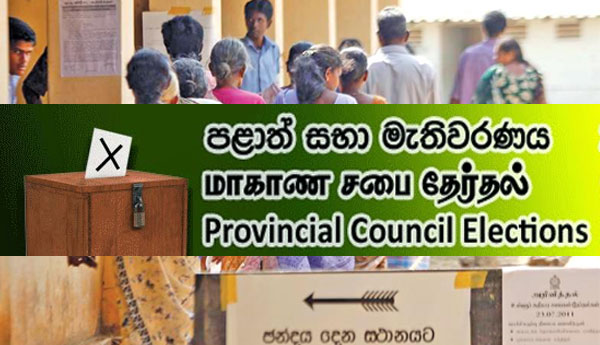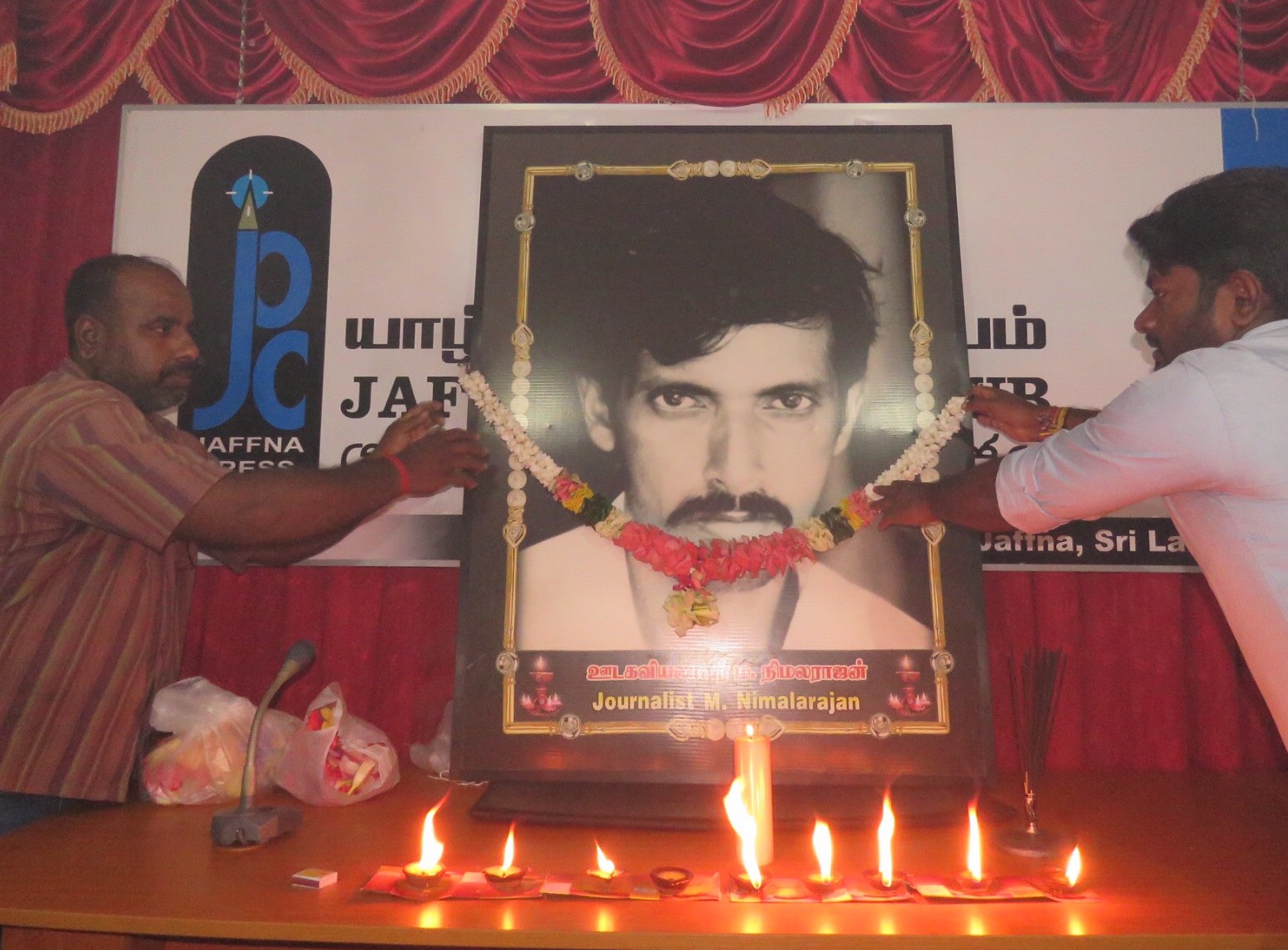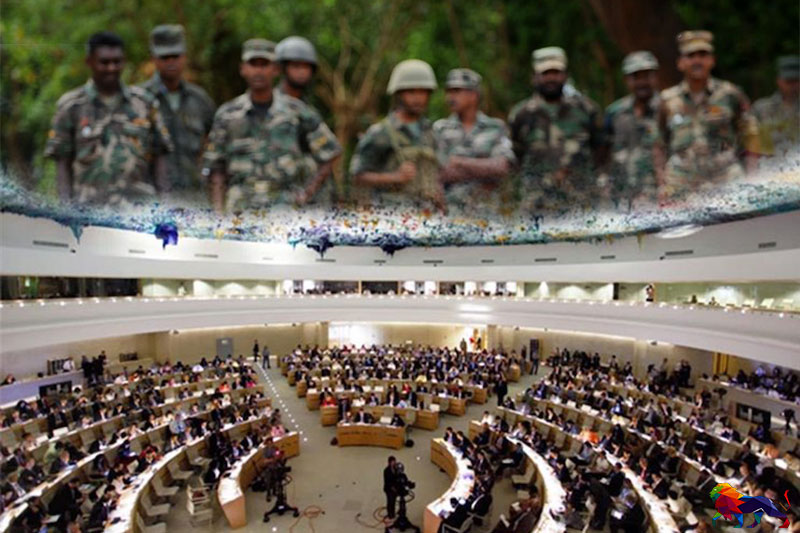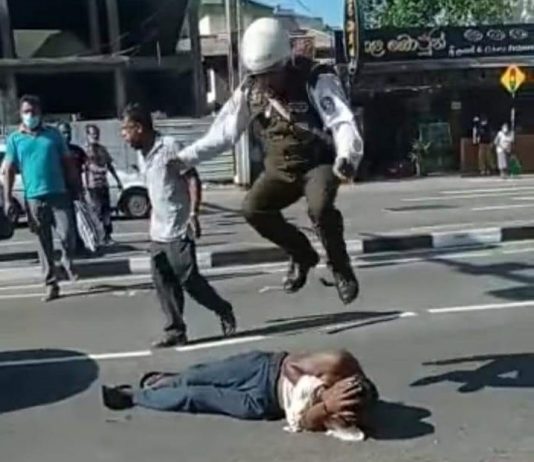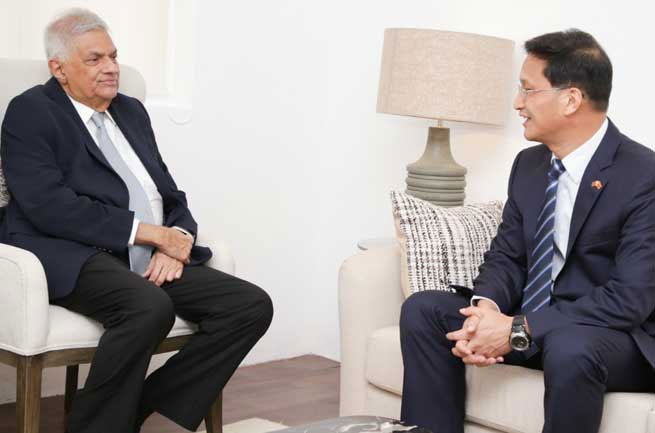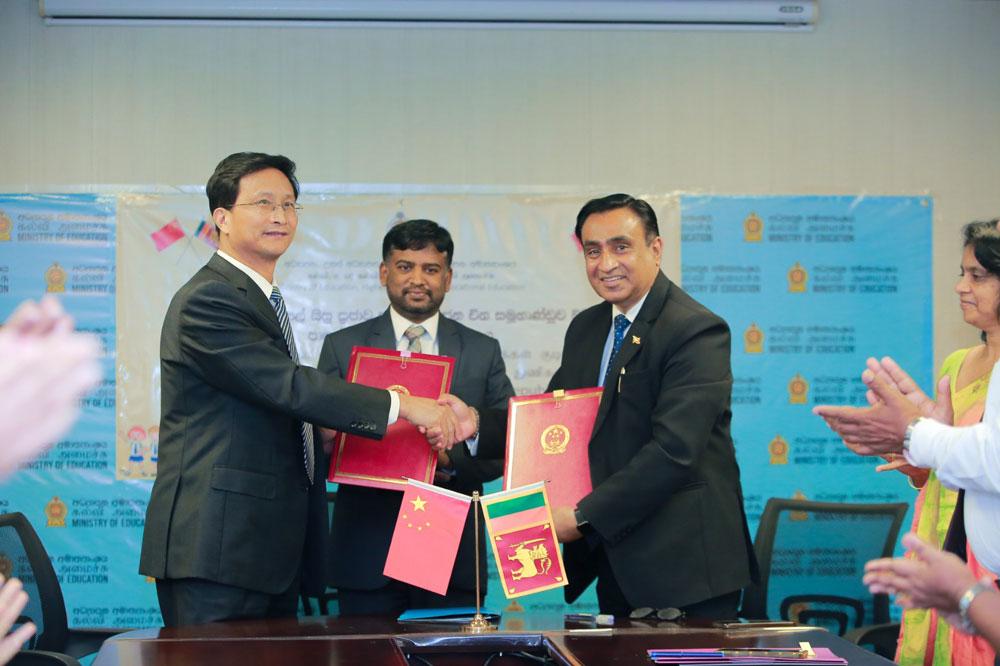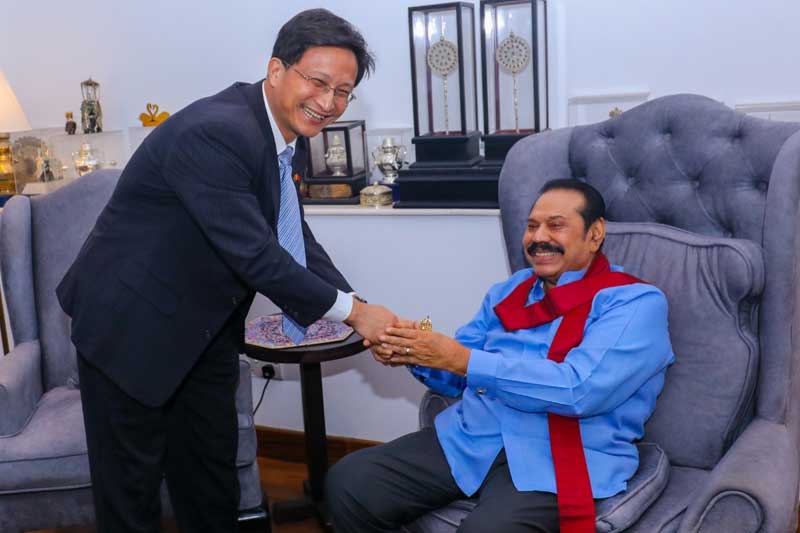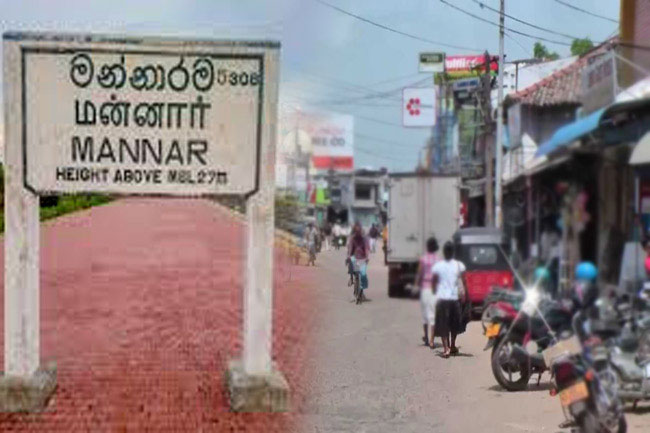Slain journalist Mylvanagm Nimalarajan was the Jaffna correspondent for Virakesari newspaper and for Sinhala weeklies Haraya and Ravaya
The case of Mylvanagam Nimalarajan’ states that Sri Lanka has systematically protected the murderers and perpetrators of these crimes
Nimalarajan’s daughter in one of the accounts said she has placed hopes on the incumbent government to ensure justice to her father’s murder
As many as 44 media workers and journalists have been killed between 2000 -2010 and a recently launched report titled ‘Killing Sri Lankan journalists: The case of Mylvanagam Nimalarajan’ states that Sri Lanka has systematically protected the murderers and perpetrators of these crimes. The report was launched during an event organised by ‘Families of the Disappeared’ to commemorate the work of this brave journalist and it is an example of the ongoing impunity surrounding the assassination of Nimalarajan. He was the Jaffna correspondent for Virakesari newspaper and for Sinhala weeklies Haraya and Ravaya. He reported for Tamilnet and was a stringer for BBC’s Tamil and Sinhala service. The report underscores the systemic failure to prosecute those responsible, failures that may have tragically enabled further violations, including subsequent targeted killings by suspects who were never brought to justice.
Who is accountable for crimes committed against journalists?
The event commenced by lighting lamps and paying tribute to everyone who had to pay the price with their lives for exposing the truth during the height of the armed conflict. Speaking at the event, Brito Fernando, Families of the Disappeared Chairman and human rights activist said that there are no records to prove the actual number of people who have been subject to enforced disappearances during 1971, 1989 uprisings and during the civil war in the North. “There is a serious concern with regards to accountability around the disappearances and assassinations of journalists. Despite various obligations made at the UNHRC sessions in Geneva, we haven’t achieved anything tangible with regards to the human rights situation in the country, particularly in terms of seeking justice for what happened to Nimalarajan and other journalists. When the incumbent government assumed power many families of victims subject to enforced disappearances had faith about the accountability process and ensuring justice to their loved ones, particularly because these individuals have stayed loyal to the party. Even Nimalarajan’s daughter in one of the accounts said she has placed hopes on the incumbent government to ensure justice to her father’s murder. We have cried and wept enough and we need to seek truth, justice and compensation. There’s a gap between what needs to be done and what could be done and it is important to bridge this gap,” he underscored.
Ongoing impunity on Tamil journalists
N. Vidyadharan, Editor of the Murasu Newspaper had been a close associate of Nimalarajan. Sharing his brief experience with Nimalarajan, he said that after 1990, the situation in Jaffna was different. “There was no social media and news was propagated to people mainly via print or radio. I remember warning him to take care of his life but he couldn’t save his life. Even though some progress has been made on cases such as Prageeth Ekneligoda and Lasantha Wickrematunga, there’s impunity on Tamil journalists. With regards to Nimalarajan’s case it’s easy to investigate and find culprits. The Prevention to Terrorism Act (PTA) was introduced to crush terrorism but state terrorism continues. Tamil journalists are being punished for exposing the truth. If the ruling party is keen to seek the truth we are there to support these investigations,” he added.
According to Chandana Keerthi Bandara, ex-Senior Producer at BBC Sinhala Service Nimalarajan would pedal his bicycle around the military-infested Jaffna peninsula to wherever the story was, be it a scene of a bomb blast, a family searching for their disappeared or powerful politicians engaged in vote-rigging or whether it was Tamils braving the odds to achieve a semblance of ordinary life. In his recollection of Nimalarajan, Bandara states that he had no equipment to file a report online; his community lacked electricity, let alone the internet. “Instead, Nimalarajan wrote these stories by putting pen to paper, with passion and objectivity, then he awaited the telephone call from London and would read them out,” the account read.
A call to end impunity against all crimes
Speaking at the event, senior journalist and media rights activist Mandana Ismail Abeywickrema said Nimalarajan was murdered two years after she joined media. “Back then I worked at The Sunday Leader newspaper and we wrote about his murder. I still recall the story of his sister and I was in complete shock because I was only 20 at the time and it was the first time I heard an incident of this nature. But the fact that justice has not been served to this individual or his family even 25 years later is a something that we should be ashamed of. The murder or disappearance of any individual is a blow to humanity. This report includes faces of 44 journalists who have been shot, murdered or disappeared and each one of them have their own families and parents. They have been bearing the brunt of these atrocities for decades. I remember hanging one of Nimalarajan’s photos in our editorial. As years passed by, the collection of such photographs of journalists increased. In 2009, my own editor Lasantha Wickrematunga was also assassinated and we had to add his photo as well to this collection. When this happened only we realized the trauma experienced by the families. For how long should we keep counting these incidents?” she questioned.
She said that it took a while for people to question who is accountable for these atrocities. “But we ultimately took to the streets and longed to make a change. One such example of change was the change in government in 2015. But I would describe it as one of the biggest betrayals in the history of Sri Lankan politics. People voted for change, for justice. We lit lamps near Lasantha Wickrematunga’s grave and voted at this election. But several years later we are still seeking justice. If we want to progress as an advanced society we need to end impunity against all crimes,” she underscored.
Failures and coverups
The report critically examines how the Sri Lankan justice system responded to Nimalarajan’s assassination, drawing on a detailed analysis of the official court record, from the day after his death until November 2021, when the suspects were released on bail. The report reveals that despite the best efforts of some individuals within the system, the investigation process was never designed or intended to lead to justice and accountability.
Speaking about the government’s response at the UNHRC sessions in Geneva, K. W Janaranjana, senior journalist and Editor-in-Chief of Anidda newspaper said that every September, successive regimes have asked for more time saying that they are a new government etc. in an attempt to delay the process of justice for those who are longing for truth and justice. “This government too will follow a similar path. Today we are talking about media freedom, human rights and so on. But at the time when Nimalarajan engaged in reporting, there was uncertainty hovering around reporters. Prior to his death, the Army referred to him as someone supporting the LTTE. He was blamed for keeping a file of politicians’ names and details. Some even claimed that he was going to submit it to the LTTE. The Eelam People’ Democratic Party (EPDP), LTTE, Army and various racist factions were watching Nimalarajan but despite all these obstacles, Nimalarajan did his reporting without any sort of protection. He is a hero and we need to respect him for his work,” he added.
He further said that Nimalarajan’s house was located in a high security zone. “But his assassins passed through military checkpoints, murdered him and left without leaving any trace. The Jaffna hospital was situated 1-2 km away from his house. When his family members informed the Army about the incident, the Army had said that they would send a jeep. But no jeep arrived and all casualties were taken to hospital in a tractor. While on their way, the shortcut to the hospital was barricaded and they had to take the longer route to reach the hospital. This is how he was assassinated. All facts indicate that this was very well planned,” Janaranjana added.
Shedding light on how investigations could have been expedited, he explained that a scene of crime is an important aspect that could draw links to perpetrators. “But it also depends on the criminal investigator. The report indicates how the investigations attempted to coverup all possible links to perpetrators which is one reason why it had been an uphill task to serve justice to Nimalarajan. The report speaks about the role of the Attorney General and I believe that the role of the judiciary too should be mentioned. Shouldn’t the judiciary be given authority to conduct investigations under special circumstances? One basic approach is to make judgements based on evidence presented in courts. But Sri Lanka doesn’t have the inquisitorial system where a court or judge actively investigates the facts of a case rather than being an impartial referee between opposing parties. Justice wasn’t served for Nimalarajan or his family. But at least his body was there for his family members to perform last rites and mourn his loss. There are thousands of families who haven’t even seen the bodies of their loved ones who have been subject to enforced disappearances,” he said in conclusion.
The report further issues recommendations to the Sri Lankan government, Human Rights Council, Member States and international community, government of UK, media institutions and press freedom groups and to the BBC.
Some of the main recommendations include setting up an independent investigative mechanism with international participation, establishing an independent office of the Special Counsel, engagement with international accountability mechanisms, promotion of victim participation and witness protection, support documentation and legal advocacy, champion public memorialisation and support to the family.


